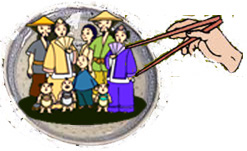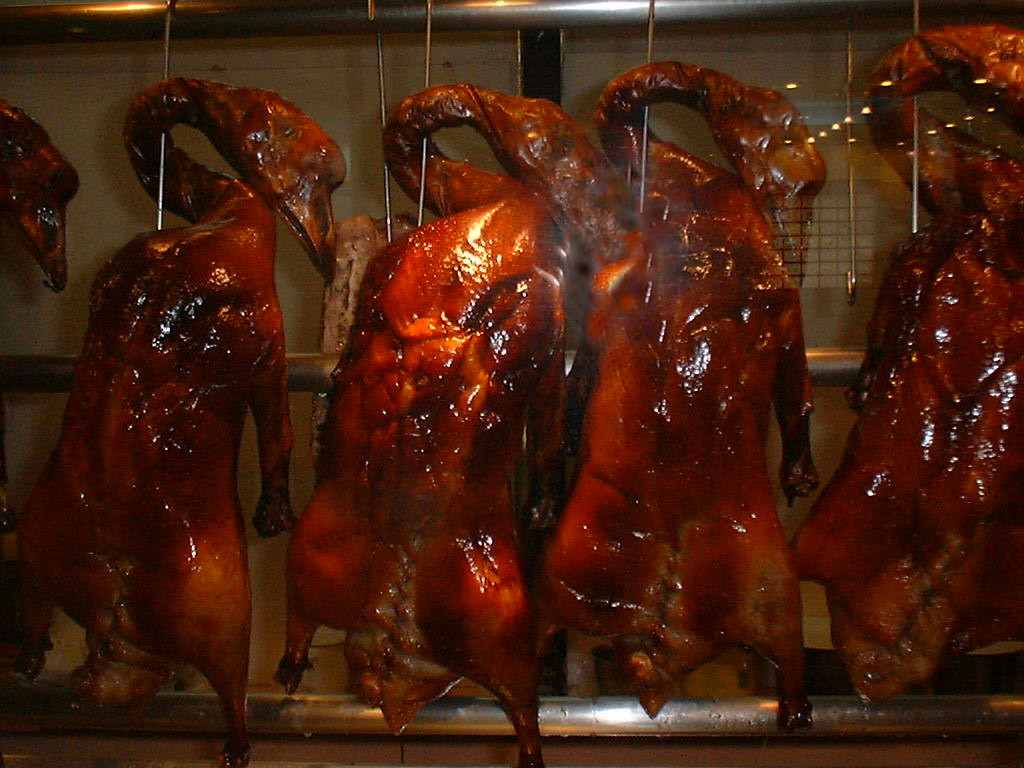China is dispatching hundreds of thousands of civet cats, who have the misfortune of being fingered as the little varmits who brought Sars to the country. It matters little, since they would have been eaten in any case, pretty much any other wild critter that is hauled into Chinese kitchens. The wilder the beast the more coveted (and expensive) it is to the Chinese palate. The Chinese will also eat parts of animals that most Westerners didn’t know existed. Thus, eating Chinese can be a real adventure, and for those of fussy palate, a survival experience.
 Death By Duck
Death By Duck
La Tour d’Argent. Pride of the new [Tokyo] Otani Hotel since 1984, La Tour d’Argent is a worthy scion of its ritzy Parisian parent [which features] . . .in the main dining room. . .the enormous drapery-sculpted marble carving table, with its silver duck press. The specialty of the house is, naturally, caneton: as in Paris you receive a card recording the number of the duck you were served. In 1921 when Crown Prince Hirohito dined at the Tour d’Argent in Paris, he had duck number 53,210; the numbers in Tokyo began with 53,211 when the restaurant opened. [Fodor’s JAPAN 90, p. 182]
My guide, Mei Ping, looked like she was ready to turn me over to the People’s Liberation Army. I had suspected for a couple of days that she might have once been a “Red Guard”. It was that stern, j’accuselook that said: “You running capitalist dog. You decadent Western pig. Admit that the reason you wanted to take the subway in Beijing is to discover the weaknesses in our Civil Defense system! We have ways of getting at the truth.” That sort of look.
Now she was giving me that look again, because I had the effrontery to decline the much-ballyhooed “Peking Duck Dinner”. To add to the cultural insult I had asked to be taken to a restaurant that had a Western menu, preferably one that had as a choice: Spaghetti Bolognese.
She glared at me, but told the driver to take me to the Gloria Plaza Hotel.
Chinese food may be one of my very favorite cuisines, but I can’t eat it every day, and there are definitely a few dishes that I would prefer to starve before eating. But Chinese food in general is right up there near the top of the list for me, though not as high as Spaghetti Bolognese.
Still, Chinese food was the only cuisine that I had been eating for nearly two weeks. And now that I was in Beijing, where it was possible to get some variety into my diet I craved Spaghetti Bolognese. I was obsessed with thoughts of rich meat-laced sauce over al dente pasta, not those flaccid Chinese noodles I’d been slurping up for days on end. And nothing could be further from my palate’s desire than Peking Duck!
That’s what really got Mei Ping’s goat (or should it be “duck”); that I would refuse a dish that the Chinese just relish, and that every tour of China includes as the piéce de rèsistance. She took it as a cultural insult.
It wasn’t that I just craved, needed, some Spaghetti Bolognese, it was also that I had this fear of Peking Duck. Or rather, Death by Duck!
I had read in a book by a journalist from a respectable newspaper that, since China had opened itself to the West in the early 1970s and large numbers of westerners had come to visit its magnificent sights and eat its delicious food, there had emerged a curious dark, and little known phenomenon quietly referred to as “death by duck.
The scenario of this form of demise was described as follows: tour groups containing large numbers of overweight and under-exercised Americans come to Beijing, a city with a pollution index equivalent to three packs of cigarettes (or one pack of a Chinese brand) per day, and are toured through the huge complex of the Temple of Heaven, then taken to the Great Wall, which they clamber over in the suffocating summer heat, and then are returned to their hotels for the promised and much-ballyhooed, Peking Duck Dinner. Take the permutation of lack of physical fitness, bad air, over exertion, dehydration, and the sudden infusion of enough fat and cholesterol to clog an artery the diameter of a garden hose and you have the formula for “Death by Duck”. The book went on to say that there’s a not inconsiderable number of Western tourists have returned home through customs in a box and Chinese characters on certificate that indicate, if in clinical terms, Chi ya er si (eat duck cause death).
At first surprised by the information I was less so when I researched the recipe for the preparation of Peking Duck. It’s been perilous being a duck in China at least since the 15th century when the delicacy became a dish for more than just the aristocracy. They are herded in great numbers through the streets, piled like feathered firewood on the backs of tricycles, their carcasses hang ignominiously, curing in the open air on bamboo poles on buildings and balconies, strung-up like little baby sleeper pajamas, and they end up dangling in their bronzed skins in restaurant windows.

Killer ducks on display in restaurant window
© James A. Clapp
The cooking process is long and complex. After being scalded, coated with molasses, inflated with air, and hung out to dry for up to two days, they are roasted over different woods to a golden brown. The lacquered-looking duck is cut up and served with a sweet bean sauce and paper-thin pancakes. The most favored morsels are the vessel-clogging, duck skin.
Of course I did not related my phobia of “death by duck” to Mei Ping. Such a faux pas on my part might have resulted in my serving a few years as one of those poor wretches whose unenviable job it is to tricycle around the old hutongs (Beijing’s compounded, dense old neighborhoods) collecting last night’s chamber pot contents and ferrying the ‘night soil’ out to local farms. But a few years later I made the acquaintance of a veteran China Travel Service guide, a Mr. Wang. We exchanged addresses and when I arrived home I wrote to him to inquire what he knew about “D by D”. A few months later his letter arrived to say that in his fourteen years of guiding American tourists he knew of no cases of “D by D,” nor did any of his colleagues. In fact, he said even the term “death by duck” was unfamiliar to him or his colleagues and claimed that the author of the book I had read must have fabricated the whole this to “. . . make his story more (sic) fascinated.”
Sure. Mr. Wang doth protest too much. Fourteen years and thousands of foreign guests gorging themselves on Peking Ducks, and not a single victim of the deadly Chinese treat? Sounds like the official China Travel Service line to me. Pass the Parmesan for my Bolognese, please. For my money I am “fascinated” by the possibility that if Emperor Hirohito had experienced ‘death by duck” in 1921 the entire history of the Far East might have been different. China might have been spared the invasion and ravages of the Japanese thanks to duck No. 53,210. That Peking duck would have been a real hero for his country!
___________________________________
©2004, James A. Clapp (UrbisMedia Ltd. Pub. 1.8.2004)
